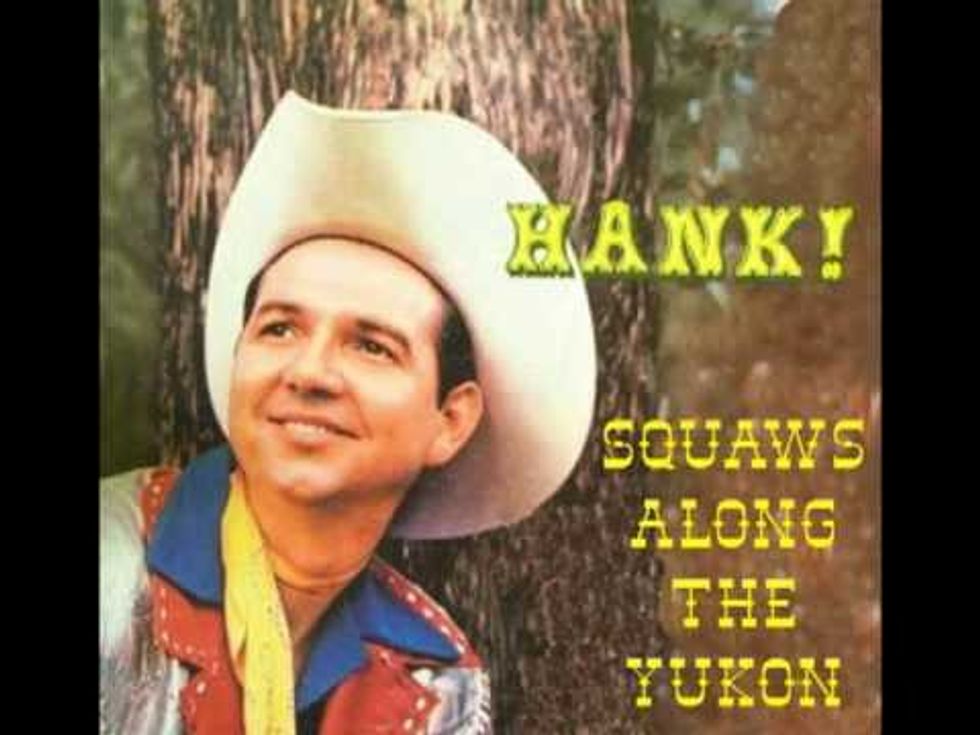‘Squaw’ Song Has Broadcast Standards Council Squawking
The independent ethics arbitrator has weighed in on another listener complaint, about a 1958 country hit by Hank Thompson which it deems to be too politically incorrect for today's audiences.

By David Farrell
The Canadian Broadcast Standards Council (CSBC) has slapped Canadian satellite radio service SiriusXM with a warning that American country singer Hank Thompson’s 1958 hit “Squaws Along the Yukon” is off limits for airplay because it “embodies elements of both racial and sexual slurs.”
The self-governing regulatory body for the nation’s private broadcasters received a complaint about the song on July 12. The complainant characterized its contents as offensive, racist and sexist.
SiriusXM responded to the complainant on September 9. It apologized for “any unintended offence [its] broadcast of the song may have caused and understand the concern given some of the outdated and insensitive references made in the song.”
"Squaws Along the Yukon" was broadcast on the Willie’s Roadhouse channel which is a classic country station featuring songs from the ‘60s, ‘70s, and ‘80s and picked up from SiriuxXM in the US.
The board acknowledged that Willie’s Roadhouse is a classic country channel "that at its best reflects the richness of country music’s history and includes older original recordings like the song."
SiriusXM argued that “such older recordings may at times reflect the insensitivity and ignorance of past eras and on occasion may use language and convey views that are now viewed by society as outdated and inappropriate."
Continuing its explanation as to why the song should not be discriminated against, the satellite broadcaster's legal team suggested that "the artistic expression of the song must be viewed in the context of the era it was recorded in, and that it was broadcast in the context of our classic country music channel." In this context, SiriusXM stated that "we are of the view that broadcasting the song did not violate the Code.”
The complainant wrote back to the CBSC, stating that she did not find SiriusXM’s response acceptable, making the point that “this material in Canada, and it should meet Canadian standards”, not American ones.
She wrote again on October 20, making the additional comment: “In 2016 there should be no excuse for broadcasting song lyrics with misogynist and racial slurs. It is not in the spirit of moving forward on reconciliation with Indigenous peoples.”
A CBSC adjudicating panel agreed.
In its decision, the quasi-judicial board stated: “While some American signals are exempt from Canadian rules, SiriusXM is licensed by the CRTC. In that CRTC licence, and in the service’s contract with the CBSC, SiriusXM is clearly responsible for all content that is broadcast on their service, regardless of where that programming originates.
"In the CBSC contract, while the CBSC acknowledged that, as a pay service, there may be greater latitude with respect to mature content (such as coarse language or sexual references) than what is acceptable over the air, there is no extra latitude with respect to abusive or unduly discriminatory content."
Further, the CBSC made clear that the use of the word “squaw” in a song is verboten.
“The Panel considers that the word ‘squaw’ has for several decades had very negative connotations when used to describe Indigenous women. It embodies elements of both racial and sexual slurs. The Panel considers that these negative connotations existed when the song was initially published. The Panel recognizes, however, that historically the word may have been in relatively common usage among certain groups in society.
“Language evolves over time. While this word was perhaps once widely used, it is no longer acceptable. The Panel notes as evidence the many efforts to have the word removed from place names across the United States, multiple dictionary definitions and the adjudicators’ experiences. The Panel finds unequivocally that the word on its face is not acceptable for broadcast in Canada absent one of the considerations set out in Clause 10 of the CAB Equitable Portrayal Code.”
Other songs deemed off-limits by the Board include “Boyz in the Hood” by Dynamite Hack, “Livin' It Up” by Limp Bizkit, and “Outside” by Aaron Lewis and Fred Durst. In 2011, the Board ruled that “Crazy Bitch” by Buckcherry couldn’t be sanctioned because the complainant failed to provide specific time/date stamping for the broadcasting of the song and, in its view, the song’s lyrics were not unduly sexually explicit or offensive.
In January 2011, the council’s Atlantic Regional Panel ruled against CHOZ-FM in a complaint regarding the song “Money for Nothing” by Dire Straits.
The council ruled that Canadian radio stations must mute or otherwise edit out the word "faggot" before airing the original version of the song. The CRTC has asked the council to review their ban after they received numerous complaints about the ban. On August 31, the CBSC reiterated that it found the slur to be inappropriate; however, because of considerations regarding its use in context, the CBSC has left it up to the stations to decide whether to play the original or edited versions of the song.
Most of the CBSC panelists thought the slur was inappropriate, but it was used only in a satirical, non-hateful manner.
The CBSC's Hank Thompson song ruling in full can be viewed here.
















